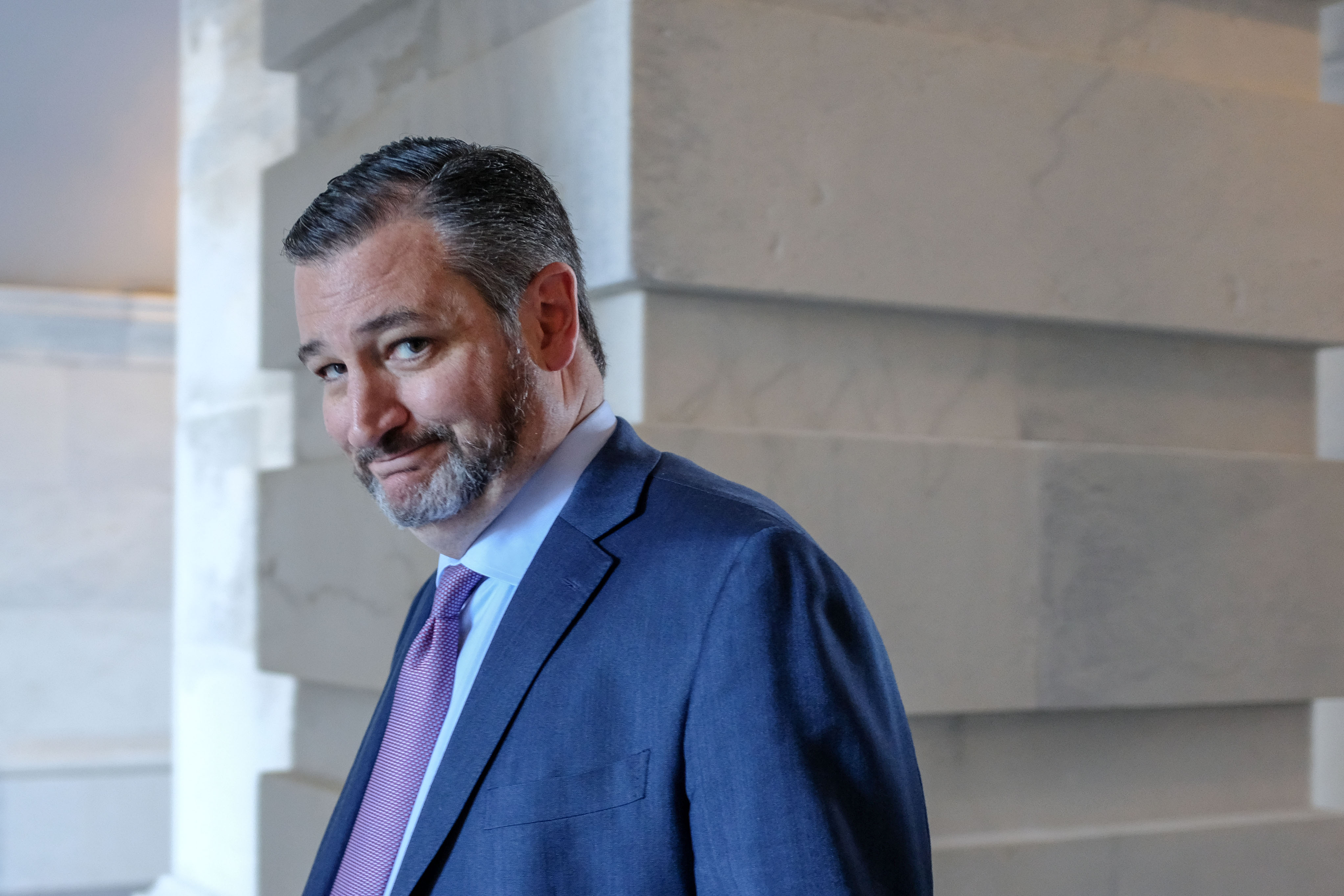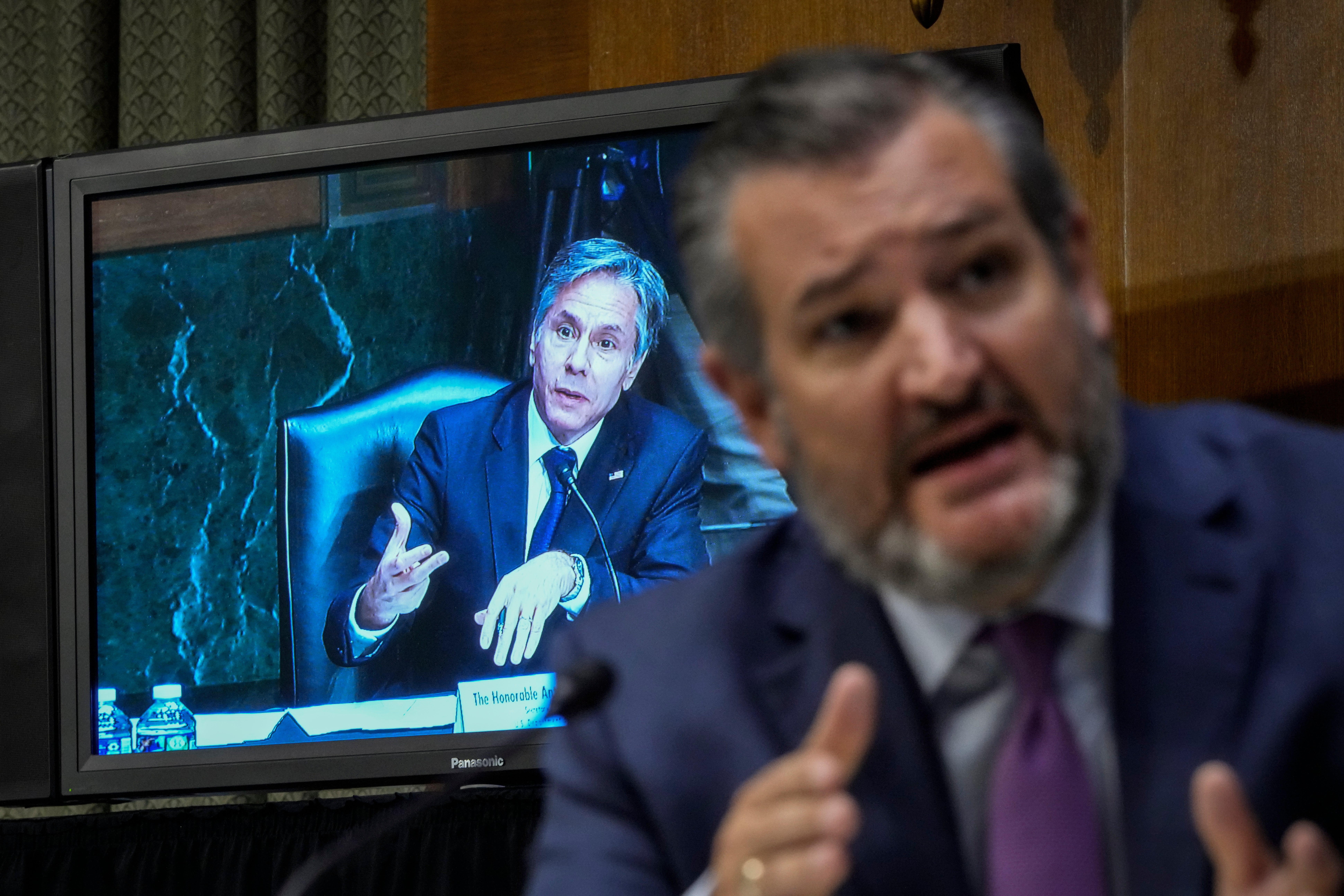Why a ‘smirking’ Ted Cruz is holding up Joe Biden’s global outreach
Texas senator claims president has given a gift to Russia, writes Andrew Buncombe


Ted Cruz can be a singular beast.
Anyone who has witnessed the Texan’s journey from rabble-rousing senator to presidential hopeful knows there are few things he will not do – no insanity he will not swallow – if he perceives it will work to his benefit.
In the Republican presidential primary race that generated much noise and bluster in 2016, he positioned himself as a principled conservative who would defend the US constitution, without resorting to the rhetoric of Donald Trump.
As it was, Trump would insult Cruz’s wife and allege his father was involved in the assassination of JFK, on his way to trampling him and winning the nomination the primary. The Texan’s outrage lasted a month or so, before he endorsed Trump, who went on to become the sort of rule-snapping president Cruz had vowed he himself would never be.
During Trump’s term, there were fewer more loyal allies than Cruz. And when Trump lost his bid for re-election, claiming, falsely, it had been rigged, the Harvard-educated Cruz went along with the lie, marshalling Republicans who refused to certify Biden’s victory, even as the Capitol was being overrun by a “stop-the-steal” mob.
The reason? Because Cruz calculated he needed the support of Trump’s supporters, not only in securing re-election to the Senate in 2024, but if the former reality star sits out the presidential race that year then his legions of supporters could lend their votes to any Cruz attempts to take the White House.
The senator’s latest piece of political skulduggery has him slow-marching the confirmation process of Biden’s ambassadorial picks, those individuals who represent the US in foreign capitals from Bogata to Beijing, and also at bodies such as the UN and Nato. In short, they do much of the heavy lifting of the nation’s engagement on the international stage, something Biden vowed to improve upon, after four years in which America suggested it was much more concerned about itself than the rest of the world.
These individuals are Biden’s to select, typically a combination of career diplomats, and political appointments. But according to the constitution, such envoys require confirmation by the Senate, a process that is usually a low-key and uncontroversial process. (There have been exceptions over the years. In 2010, Republicans rejected Norman Eisen as Barack Obama’s nominee to be ambassador to the Czech Republic.)
Yet, Cruz has turned the matter into what some termed a game of “Texas Hold ’em”. He cannot block their confirmation process entirely, but he can make the process take a long time by insisting that rather than confirming the appointees by unanimous consent, the Senate spend hours debating each of the individuals’ merits.
Reports suggest just a dozen have been confirmed so far by the Senate Foreign Relations Committee, on which Cruz sits. At least 59 have been held up, including Biden’s choices for posts such as Jerusalem, Cairo and Berlin.
Cruz claims he is motivated by “weakness” displayed by Biden to Moscow over Nord Stream 2, a controversial gas pipeline project that runs from Russia to Germany, the first line of which was completed in June.
In January, Congress voted for the US to sanction the companies involved in the project, though no such penalties were imposed by the Trump administration.
Biden also decided not to impose sanctions, instead prioritising rebuilding the US’s relationship with Germany.
Cruz claims he and other Republicans have been misled by an undertaking from the secretary of state Antony Blinken that sanctions would be pursued.
“President Biden has insisted on giving a multibillion-dollar gift benefitting Russia, hurting America and hurting our national security interests,” Cruz said in August, in a speech on the Senate floor.

Experts say there is a genuine debate to be had over whether or not Biden should have waived off on the pipeline, which critics say could undercut European energy security by making it dependent on Russia.
But some question Cruz’s motives.
Daniel Fried, a former US ambassador to Poland and assistant secretary of state for Europe, tells The Independent the envoy confirmation process is clunky, yet he believes Cruz is using it as an opportunity to simply attack Biden, rather than out of genuine concern about Nord Stream 2.
“He’s being a disruptive force for no good reason. And this sort of thing has a price.”
The Biden administration is already lacking people in many key positions, partly because Trump did not fill those jobs, and partly because the White House was slow to get started on filling those roles.
The result is the state department is being “run ragged”, says Fried, a fellow at the Atlantic Council, a Washington DC think tank. And this can lead to bad slips and blunders.
An example, says Fried, was the shabby way the US handled the launch of the US, UK and Australian security pact, known as Aukus.
The initiative, unveiled last month and which saw the US transfer nuclear submarine technology to Australia to counter Chinese influence in the Pacific, may have been a good policy for the US, says Fried.
But that way it was rolled out, without first informing France, which ended losing its own $66bn deal with Australia, caused an outcry, so much so that Emmanuel Macron withdrew his ambassadors from Washington and Canberra. (He left his envoy in London in place, a move seemingly intended to more pointedly insult Britain by suggesting it had only been a very junior player in the deal.)
As it was, says Fried, the plan was rolled out before Biden’s assistant secretary for the Bureau of European and Eurasian Affairs, Karen Donfried, had been confirmed.
There may have been no way to avoid upsetting France entirely, says Fried, but the episode would likely have been less shambolic had Donfried been in her post.
“[You needed] somebody in a senior enough level, with an eye out for Europe, to be able to raise their hand and say, ‘Wait a minute. Maybe we shouldn’t p*** off the French’,” he says.
“So, the hold up of nominating people doesn’t mean that any one mistake will inevitably be made. But it raises the odds that some mistakes will be made.”
Others are even more scathing of Cruz’s actions.
Democratic senator Bob Menendez of New Jersey, chairman of the Senate Foreign Relations Committee, said last month Cruz’s actions “pose significant national security threats to the United States”.
He said around 100 nominations for the State Department and the US Agency for International Development (USAid) were pending, a figure he termed a “crisis” number.
“We need ambassadors in place to project US power to assist and protect US citizens and to promote our companies,” he said. “We are less safe when our national security agencies are so underwhelmed.”
Cruz shows little sign of budging. In his speech in August, he said: “I’ve made clear to every State Department official, to every State Department nominee, that I will place holds on these nominees unless and until the Biden administration follows the law and stops this pipeline and imposes the sanctions.”
(His office failed to respond to inquiries.)
The State Department declined to answer questions about the impact Cruz was having, but rather highlighted comments made by Blinken, when he appeared before the same committee and pointed out how the 9/11 report published two decades ago had pointed to a failure to appoint a full team of national security officials before al-Qaeda struck.
“Today, there are nearly 80 State Department nominees pending before the Senate. Nearly two dozen have already been voted out of this committee on a strong bipartisan basis and simply await a vote in the Senate,” he said.
“For our national security, I respectfully urge the Senate and this committee to move as swiftly as possible to consider and confirm all pending nominees.”
Fried, the former ambassador, says if Cruz were genuinely concerned about energy security, he could request a briefing from a senior official.
Rather, he says, the senator appeared to be acting in a way that appeared to be entirely nihilistic.
He adds: “All he’s doing is holding it up, with a kind of smirk.”






Join our commenting forum
Join thought-provoking conversations, follow other Independent readers and see their replies
0Comments